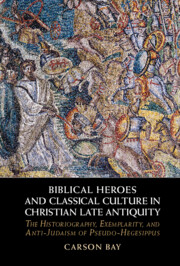
- Publisher:
- Cambridge University Press
- Online publication date:
- November 2022
- Print publication year:
- 2022
- Online ISBN:
- 9781009268523

In this volume, Carson Bay focuses on an important but neglected work of Late Antiquity: Pseudo-Hegesippus' On the Destruction of Jerusalem (De Excidio Hierosolymitano), a Latin history of later Second Temple Judaism written during the fourth century CE. Bay explores the presence of so many Old Testament figures in a work that recounts the Roman-Jewish War (66–73 CE) and the destruction of Jerusalem in 70 CE. By applying the lens of Roman exemplarity to Pseudo-Hegesippus, he elucidates new facets of Biblical reception, history-writing, and anti-Judaism in a text from the formative first century of Christian Empire. The author also offers new insights into the Christian historiographical imagination and how Biblical heroes and Classical culture helped Christians to write anti-Jewish history. Revealing novel aspects of the influence of the Classical literary tradition on early Christian texts, this book also newly questions the age-old distinction between the Christian and the Classical (or 'pagan') in the ancient Mediterranean world.
Winner, 2024 Manfred Lautenschlaeger Award for Theological Promise, Heidelberg University
‘This book offers an important new study of an important, but neglected text, the anonymous De Excidio Hierosolymitano … First, it presents the first monographic study in English of this text, and in so doing gives scholars of late antiquity, the history of Judaism, and of late ancient historiography a fine summary and interpretive introduction to the text. Second, it offers a detailed study of the text’s use of exempla as a rhetorical-historiographic strategy … As a specialist in late ancient historiography, I felt like I was learning throughout my reading of the book.’
Jeremy Schott - Professor of Religious Studies at Indiana University
‘Carson Bay’s incisive and original study brings to light a little-known but critically important late fourth century Christian historian, Ps-Hegesippus. That author’s rewriting of Josephus’ Jewish War transformed the work into a centerpiece for Christian antisemitism and supersessionism. Bay’s very careful dissection of the text shows it to be a remarkable blend of biblical stories, Jewish traditions, and classical historiography in advancing a Christian agenda in late antiquity. As Bay compellingly argues, the author employed the rhetorical techniques of Greek and Roman historians and exploited the authority of the Jewish intellectual Josephus to reinterpret the destruction of the Jerusalem Temple as divine punishment for the crucifixion of Jesus. This book brings new insights to scholars and students of the Hebrew Bible, Jewish studies, early Christianity, and classical literature alike.’
Erich S. Gruen - Emeritus Gladys Rehard Wood Professor of History and Classics at the University of California, Berkeley
 Loading metrics...
Loading metrics...
* Views captured on Cambridge Core between #date#. This data will be updated every 24 hours.
Usage data cannot currently be displayed.